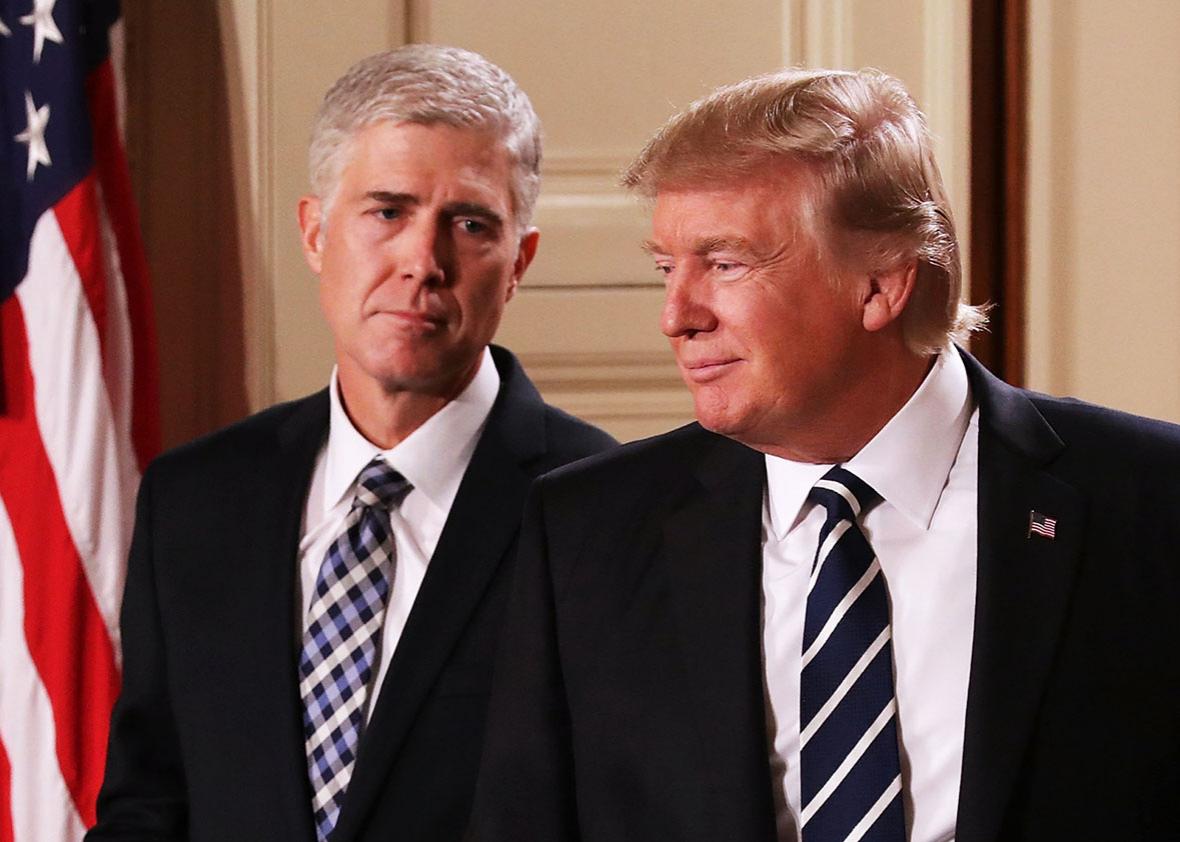Starting this week, Slate will feature a monthly dialogue between two of the nation’s most esteemed jurists, Richard A. Posner and Jed S. Rakoff. These conversations will be moderated by Joel Cohen, author of the book Blindfolds Off: Judges on How They Decide. The subject of their first conversation is the Supreme Court, and how much deference the president should be given to make selections that comport with his ideology.
Joel Cohen: Senate Democratic leader Charles Schumer has said he will oppose any Supreme Court nominee who is out of the “mainstream,” and he considers Donald Trump’s nominee, Judge Neil Gorsuch, precisely that. Might this be payback for the Republican refusal to even consider President Obama’s nomination of mainstream (and universally respected) Judge Merrick Garland? Payback or not, shouldn’t the spoils belong to the victor? Is there any reason, absent disqualifying issues in the nominee’s past, that a president shouldn’t have the right to his Supreme Court nominees?
Judge Richard A. Posner: I’m a realist. Trump has picked precisely whom he wants. Period. There are no rules or principles that govern appointment of a federal judge or justice. The president appoints, the Senate confirms or rejects. Weeping over the rejection of Garland is a total waste of time. He is a well-regarded court of appeals judge but could of course be a stealth liberal, and you can’t criticize Trump or the Republican senators for not wanting another liberal justice.
Judge Jed S. Rakoff: Judge Posner’s healthy realism is right on target. This may surprise some, but of the 151 nominees to the Supreme Court since its start, roughly one-fifth (29 to 36, depending how you count) have not made it past the Senate, and in many of these cases the opposition was bipartisan. Trump was true to his pledge to pick from the list he provided during the campaign. Virtually all of the candidates he considered—including Judge Gorsuch—were previously scrutinized and approved by the Senate for the lower courts, so it is unlikely that he has the kind of “skeleton in the closet” that would cause even a Republican senator to vote against this nominee. As for “disqualifying issues,” even after the Civil War and well into the 20th century, Supreme Court nominees exhibiting clear evidence of racism in their past conduct and attitudes were regularly confirmed, and it was only in 1970, in the heat of the civil rights movement, that a nominee (G. Harrold Carswell) was rejected on this basis. To be sure, any nominee these days would face intense scrutiny in the Senate, some of it legitimate, some of it petty, but all of it political. None of it, however, is likely to affect the final vote to confirm Judge Gorsuch.
Cohen: Perhaps the question I should have asked is not “shouldn’t the spoils belong to the victor,” but rather “should” they. We’re talking about how justice is administered in America, and you both seem totally comfortable with the president choosing Supreme Court justices based on political judgments and maybe even campaign agendas, simply based on the reality that they’ll likely be confirmed.
Posner: It’s just a question of realism. The entire process of nomination and confirmation of a Supreme Court justice (or for that matter a federal appellate or district court judge) is controlled by politicians—the president and the Senate. That can’t be changed without a constitutional amendment, or without a surge of popular commitment resulting in the election of a president and a Senate majority committed to the appointment of the best candidates from an entirely neutral, professional standpoint. The basis for example is the nomination by President Hoover (a Republican) of Benjamin Cardozo (a Democrat) in 1932, and confirmation by a Republican-majority Senate. Cardozo had the backing of the New York legal profession, which was dominant. There’s nothing like that today.
What is true is that popular support for the Supreme Court has now fallen below 50 percent. But there is no movement to alter the process by which justices are appointed. I could pick nine first-rate justices, but no one’s interested. In recent times, Eisenhower, Kennedy, and Clinton made pretty good appointments, and that I think is about it. I think it’s quixotic to imagine that the situation will be altered in the foreseeable future.
Rakoff: Since the U.S. Supreme Court exercises greater power than the highest court of virtually any other nation and its judges are appointed for life, it makes perfect sense that democratically elected politicians (i.e., the president and the senators) should control the appointments. But we should not forget that a judge’s highest duties are to be impartial and independent, and a politician who has some sense of his or her own place in history will therefore look for candidates who exhibit those qualities.
Since, however, most politicians are more concerned with their immediate agendas, the result has been that there have been more than a few mediocrities appointed to our highest court over its long history. And while I agree with Judge Posner that the Eisenhower, Kennedy, and Clinton appointments were of high quality, we should be careful not to romanticize the past. Eisenhower, for example, made many high-quality appointments to all levels of the federal judiciary, and the judges he appointed to the federal courts in the Deep South strictly enforced integration despite considerable personal danger to themselves and their families. But Eisenhower himself had limited interest in the workings of the judiciary and reportedly always regretted his nominations of Earl Warren and William Brennan. His appointments were largely the work of the two men who successively served as his attorney general, Herbert Brownell Jr. and William P. Rogers—“Wall Street lawyers” and active Republicans, who, as it turned out, were imbued with the highest ideals of the legal profession.
